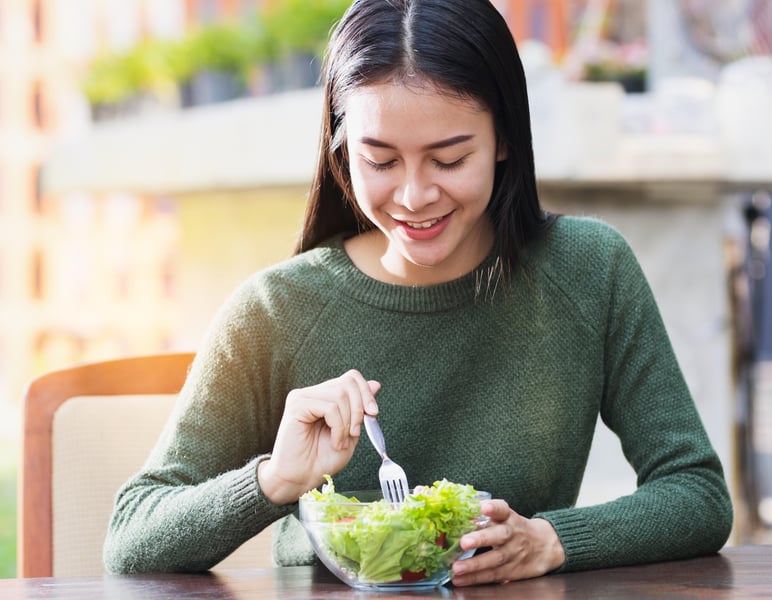Get Healthy!

- Cara Murez
- Posted October 12, 2022
A Teen Girl's Diet Could Impact Her Odds for Menstrual Pain
While working on a senior research project as part of her undergraduate degree from Rutgers University, Serah Sannoh decided to analyze peer-reviewed studies on diet and menstrual period pain, partly because of her own struggles with the issue.
What did she find? Sannoh reported in her new study that her research showed foods high in omega-6 fatty acids promoted inflammation, a key culprit in menstrual pain, whereas a diet high in foods with omega-3 fatty acids reduced inflammation.
Menstrual pain, also known as dysmenorrhea, happens when muscles in the uterus contract. Prostaglandins, chemicals involved in inflammatory responses, make matters worse.
"I would just suggest that young women take a look at your lifestyle and the diet that you have, dietary behaviors, and see if there are any changes that could help improve the pain that they experience,"said Sannoh, now a medical student at Temple University in Philadelphia.
While 90% of adolescent girls report menstrual pain, many don't seek treatment. It is a leading cause of school absences for young women, according to the study.
Those foods that Sannoh's research pinpointed as being problematic are also popular, including red meat, sugar, salt, dairy, coffee and oils.
"The American diet is very high in omega-6 fatty acids,"Sannoh said.
People on a vegan diet had the lowest rates of inflammation, the research showed.
"Diet does have an effect on your health, and I feel that this is often overlooked,"Sannoh said. "Sometimes people would just want to see if there's a medication that they could take. And that's fine, but if there's a way to holistically stop a beginning step in this painful cascade, I feel like that would be better for some people to adopt and it will also help them improve their health overall."
Still, more research is needed, Sannoh said.
"I believe that this could be applied to all ages, but that's another reason why I would like more research done on this subject so that we could see the actual effects of these diets long-term,"she added.
Sannoh was scheduled to present her findings Wednesday at the North American Menopause Society annual meeting, in Atlanta. Such research is considered preliminary until published in a peer-reviewed journal.
Dr. Monica Christmas, director of the University of Chicago's Center for Women's Integrated Health, further explained the impact of prostaglandins. High levels may increase constriction of the blood vessels that supply blood to the uterus. When restricting that blood flow, it can cause cramping.
"That's why ibuprofen or Midol or Aleve -- all of the non-steroidals -- work is because you're taking something that blocks that prostaglandin release and you minimize that vasoconstriction process,"Christmas said. "With this study, they're saying, 'Hey, look, can we have people just adhere to an anti-inflammatory diet and is that enough to block the prostaglandin release so that you don't get that vasoconstriction?' And it seems to be."
In her own life, Christmas follows a mostly plant-based diet because of the health benefits, with some exceptions for occasional dairy and sushi.
While Christmas often works with patients in menopause, sometimes they arrive in her office with significant symptoms, including rapid weight gain, mood swings and arthritis. But an earlier transition to a less inflammatory diet could help.
"If you've got adolescents that are really honing in on adhering to an anti-inflammatory diet, which is also really just a healthy way to eat at an early age, do we really offset some of the things that they may experience later on?"Christmas asked.
Eating foods that are inflammatory can also increase risk for diabetes, arthritis and heart disease, Christmas noted.
Christmas recommends eating a Mediterranean diet, full of colorful fruits, green leafy vegetables, brown rice or whole grains, oatmeal, and fresh herbs and spices.
"Having people nourish their bodies with foods that are going to have them have their most optimal health, longevity, think better, function better and live an overall healthy life, and minimize their risk of co-morbidities that increase as we get older, I think is just the best way to eat,"Christmas said.
More information
The U.S. National Library of Medicine has more on period pain.
SOURCES: Serah Sannoh, BS, graduate, Rutgers University, New Brunswick, N.J.; Monica Christmas, MD, associate professor, obstetrics and gynecology, director, Center for Women's Integrated Health, University of Chicago, and board member, North American Menopause Society, Chicago; North American Menopause Society annual meeting, Atlanta, Oct. 12-15, 2022






